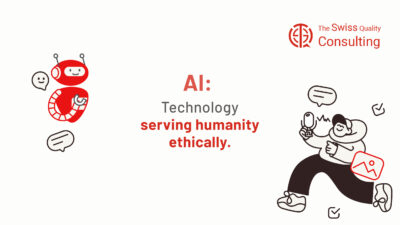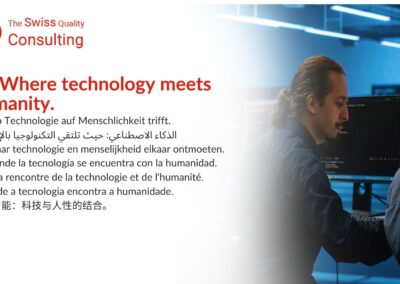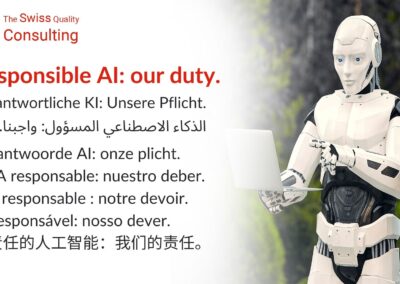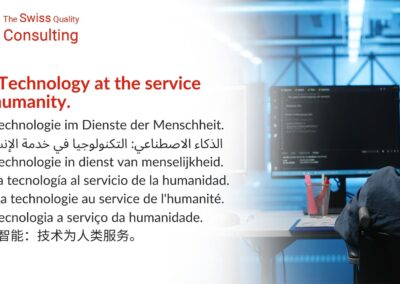Ensuring Responsible AI Implementation for Business Success
The Importance of Ethical AI in Modern Business
In today’s rapidly evolving technological landscape, ethical AI in business is not just a competitive advantage but a fundamental duty to humanity. As Artificial Intelligence (AI) continues to permeate various industries, its ethical implementation becomes crucial to ensure that technology serves the greater good without compromising human values. For business executives, mid-level managers, and entrepreneurs in regions like Saudi Arabia and the UAE, understanding and applying ethical AI principles is essential for achieving sustainable business success and fostering trust among stakeholders.
Saudi Arabia has been at the forefront of AI adoption, with initiatives like the Saudi Vision 2030 emphasizing the integration of AI across various sectors. However, with this rapid technological advancement comes the responsibility to ensure that AI systems are designed and deployed ethically. Ethical AI practices involve ensuring transparency, fairness, and accountability in AI algorithms, thereby preventing biases and discrimination. By adopting ethical AI, Saudi businesses can build trust with their customers and partners, ultimately enhancing their brand reputation and competitive edge.
In the UAE, cities like Dubai are leading the way in AI innovation with smart city projects and advanced technological initiatives. Implementing ethical AI in these projects ensures that the benefits of AI are distributed equitably among all citizens. For instance, Dubai’s AI strategy focuses on creating a regulatory framework that promotes ethical AI use while safeguarding individual privacy and data security. This commitment to ethical AI not only fosters public trust but also attracts global investors and partners who prioritize responsible technology practices.
Executive Coaching and Change Management for Ethical AI Adoption
Implementing ethical AI in business requires more than just technological expertise; it necessitates strong leadership and effective change management strategies. Executive coaching services play a pivotal role in equipping business leaders with the skills and knowledge needed to champion ethical AI initiatives within their organizations. Through targeted coaching programs, executives in Saudi Arabia and the UAE can develop a deep understanding of AI ethics and learn how to integrate these principles into their strategic decision-making processes.
Effective communication is another critical aspect of successful ethical AI adoption. Leaders must clearly articulate the importance of ethical AI to their teams and stakeholders, fostering a culture of transparency and accountability. In Riyadh, for example, companies are leveraging executive coaching to enhance their leaders’ communication skills, ensuring that ethical AI principles are consistently reinforced across all levels of the organization. This approach not only promotes a shared understanding of AI ethics but also empowers employees to identify and address potential ethical issues proactively.
Change management is also essential for navigating the complexities of ethical AI implementation. Businesses in Dubai are employing comprehensive change management strategies to facilitate the smooth integration of ethical AI practices. These strategies involve engaging stakeholders, providing continuous training, and establishing clear guidelines and policies for AI use. By adopting a structured approach to change management, Dubai companies can ensure that their ethical AI initiatives are effectively implemented and sustained over time, driving long-term business success.
The Role of Management Consulting in Ethical AI Deployment
Management consulting services play a crucial role in guiding organizations through the ethical AI deployment process. Consultants with expertise in AI ethics can provide valuable insights and recommendations, helping businesses navigate the challenges and opportunities associated with ethical AI. In Saudi Arabia, management consulting firms are partnering with local companies to develop customized ethical AI frameworks that align with their specific business goals and regulatory requirements. These frameworks provide a roadmap for ethical AI implementation, ensuring that businesses can leverage AI responsibly and sustainably.
In the UAE, management consultants are assisting companies in integrating ethical AI into their broader digital transformation strategies. By conducting thorough assessments of existing AI systems and processes, consultants can identify potential ethical risks and recommend appropriate mitigation measures. This proactive approach enables UAE businesses to address ethical concerns early in the development process, reducing the likelihood of negative impacts on their operations and reputation. Furthermore, consultants can help organizations stay abreast of evolving AI ethics standards and best practices, ensuring continuous improvement and compliance.
One notable example of successful ethical AI deployment in Dubai involves the use of generative AI in customer service applications. Management consultants worked closely with businesses to design and implement AI systems that prioritize customer privacy and data security. By incorporating ethical considerations into the AI development lifecycle, these businesses were able to enhance their customer service capabilities while maintaining high ethical standards. This approach not only improved customer satisfaction but also demonstrated the company’s commitment to responsible AI use.
Conclusion: Embracing Ethical AI for Future Business Success
As AI technology continues to advance, the importance of ethical AI in business cannot be overstated. For companies in Saudi Arabia and the UAE, adopting ethical AI practices is not only a moral obligation but also a strategic imperative for achieving sustainable growth and maintaining a competitive edge. By integrating ethical AI principles into their operations, businesses can build trust with stakeholders, enhance their brand reputation, and drive long-term success.
Executive coaching, effective communication, and change management are essential components of successful ethical AI adoption. By investing in these areas, business leaders can create a culture of transparency and accountability, ensuring that ethical AI principles are consistently upheld across the organization. Additionally, management consulting services provide valuable guidance and support, helping businesses navigate the complexities of ethical AI deployment and align their practices with global standards.
In conclusion, ethical AI in business is a duty to humanity that requires a holistic approach encompassing leadership, communication, and strategic planning. By embracing this responsibility, companies in Saudi Arabia and the UAE can set a global standard for ethical AI use, driving innovation and success while safeguarding human values and societal well-being.
—
#EthicalAI #AIBusiness #ExecutiveCoaching #ChangeManagement #BusinessSuccess #ManagementConsulting #SaudiArabiaAI #UAEEthics #RiyadhLeadership #DubaiInnovation #AIEthics #ResponsibleAI























